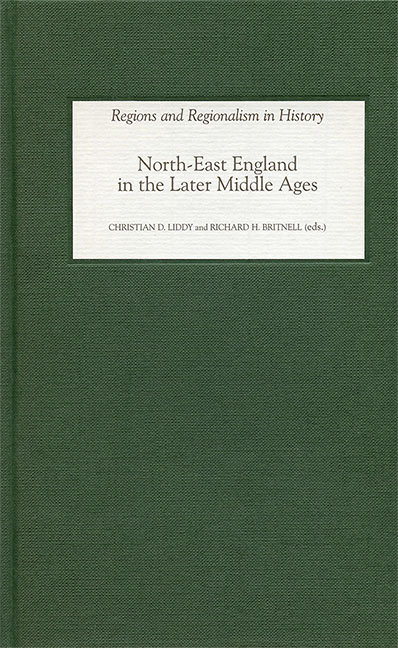Book contents
- Frontmatter
- Contents
- List of Illustrations
- Contributors
- Preface
- Abbreviations
- Introduction
- 1 St Cuthbert and the Border, c.1080–c.1300
- 2 John Hardyng, Northumbrian Identity and the Scots
- 3 Remembering the Legal Past: Anglo-Scottish Border Law and Practice in the Later Middle Ages
- 4 Scaling the Ladder: The Rise and Rise of the Grays of Heaton, c.1296–c.1415
- 5 Land, Legend and Gentility in the Palatinate of Durham: The Pollards of Pollard Hall
- 6 Local Law Courts in Late Medieval Durham
- 7 The Free Court of the Priors of Durham
- 8 Church Discipline in Late Medieval Durham City: The Prior as Archdeacon
- 9 Economy and Society in North-Eastern Market Towns: Darlington and Northallerton in the Later Middle Ages
- 10 Newcastle Trade and Durham Priory, 1460–1520
- 11 The Size and Shape of Durham’s Monastic Community, 1274–1539
- 12 Peasants, Landlords and Production between the Tyne and the Tees, 1349–1450
- 13 Wastes, the Margins and the Abandonment of Land: The Bishop of Durham’s Estate, 1350–1480
- 14 Framing Medieval Landscapes: Region and Place in County Durham
- Index
8 - Church Discipline in Late Medieval Durham City: The Prior as Archdeacon
Published online by Cambridge University Press: 23 March 2023
- Frontmatter
- Contents
- List of Illustrations
- Contributors
- Preface
- Abbreviations
- Introduction
- 1 St Cuthbert and the Border, c.1080–c.1300
- 2 John Hardyng, Northumbrian Identity and the Scots
- 3 Remembering the Legal Past: Anglo-Scottish Border Law and Practice in the Later Middle Ages
- 4 Scaling the Ladder: The Rise and Rise of the Grays of Heaton, c.1296–c.1415
- 5 Land, Legend and Gentility in the Palatinate of Durham: The Pollards of Pollard Hall
- 6 Local Law Courts in Late Medieval Durham
- 7 The Free Court of the Priors of Durham
- 8 Church Discipline in Late Medieval Durham City: The Prior as Archdeacon
- 9 Economy and Society in North-Eastern Market Towns: Darlington and Northallerton in the Later Middle Ages
- 10 Newcastle Trade and Durham Priory, 1460–1520
- 11 The Size and Shape of Durham’s Monastic Community, 1274–1539
- 12 Peasants, Landlords and Production between the Tyne and the Tees, 1349–1450
- 13 Wastes, the Margins and the Abandonment of Land: The Bishop of Durham’s Estate, 1350–1480
- 14 Framing Medieval Landscapes: Region and Place in County Durham
- Index
Summary
The prior of Durham claimed the right to exercise archidiaconal jurisdiction over all the churches appropriated to the priory in Durham and Northumberland and by 1435 certainly was using his rights regularly, both to visit and to correct his flock in his court. The object of this essay is to ask a few questions about the exercise of the jurisdiction in the city itself.
The evidence concerning the archdeacon's court is very good. There are two court books: Capitula generalia, 1435–56, and the Court Book of the Prior's Official, 1487–98. There are also references in the letter-books of the priory. In addition, we have some records of the secular courts so that sometimes one can see persons litigating or being dealt with in both types of court and often one can know more about them.
From at least 1435 the court met in Durham, usually in St Oswald's Church, every three weeks on Thursdays, and by the later period every week. The court book records of the sessions are typically summary but include some witness statements, documents issued by the court, monitions and even a few visitation records. The prior seldom sat in person but used a series of officials and commissaries.
All the usual archidiaconal cases occur. Both court books include many cases of sexual misconduct, fornication, adultery, keeping a woman, matrimonial disputes – either claiming that one had occurred or attempting annulment. The later volume has many more cases of lesio fidei, concerning debts. The first contains a few cases about sorcery, whereas the second has none. Both contain breaches of the Sabbath, failure to attend church on Sundays or holydays (or working on these same days), and failure to receive the Eucharist in the parish church at Easter. Although some business came ex officio, sometimes from visitations, plenty did not.
The prior and his obedientiaries brought claims about rents and dues, and defended other rights there. So the hostillar claimed one quarter of barley, or the sacrist tithes from some parishioners of Edlingham and Lemmington, where he was the rector. The almoner claimed rent from a widow, which her husband had owed.
- Type
- Chapter
- Information
- North-East England in the Later Middle Ages , pp. 119 - 126Publisher: Boydell & BrewerPrint publication year: 2005

